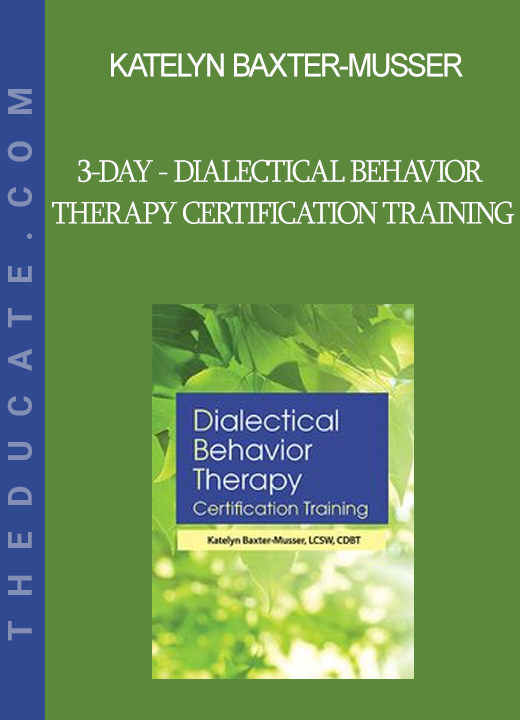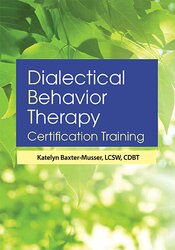Description
Katelyn Baxter-Musser – 3-Day: Dialectical Behavior Therapy Certification Training
- Faculty:
- Katelyn Baxter-Musser
- Duration:
- 20 Hours 22 Minutes
- Format:
- Audio and Video
- Copyright:
- Jan 22, 2020
Description
Dialectical Behavior Therapy is a powerful, evidence-based treatment that allows clinicians to provide positive outcomes for clients of all ages struggling with stress, depression, trauma, suicidal and self-destructive behaviors and a variety of other clinical presentations.
This 3-day Certification Training will build the core competencies you need to bring DBT into your clinical practice and effectively use it with a wide range of client types. In this 21-hour recording, you’ll be given a roadmap to treat individuals using the skills and techniques from DBT so you can help your most challenging clients reach new levels of healing.
Even if you’ve completed other Dialectical Behavior Therapy (DBT) trainings, this program will increase your competency and clinical sophistication with DBT when working with adults, youth, substance users and trauma survivors in a wide variety of settings.
Best of all, this training meets the educational requirements when applying to become Certified in Dialectical Behavior Therapy (C-DBT) through Evergreen Certifications. Certification lets colleagues, employers, and clients know that you’ve invested the extra time and effort necessary to understand the complexities of using DBT in counselling. Professional and clinical experience standards apply. Visit www.evergreencertifications.com/cdbt to get started!
Purchase today and get the skills and confidence you need to successfully help your clients with the power of DBT!
PESI, Evergreen Certification Institute, and Katelyn Baxter-Musser, LCSW, are not affiliated or associated with Marsha M. Linehan, PhD, ABPP, or her organizations.
Handouts
| Manual – Dialectical Behavior Therapy Certification Training (30 MB) | 195 Pages | Available after Purchase |
| Handout Packet – Dialectical Behavior Therapy Certification Training (5.4 MB) | 30 Pages | Available after Purchase |
Outline
Foundations of DBT
- Biosocial Theory
- Characteristics of DBT
- DBT as an evidence-based practice
- Dialectics: the balance of acceptance and change
DBT in the Clinical Setting
- Application of DBT in the individual and group therapy setting
- Skills training methods
- Validation strategies
- Research and limitations
DBT Skills Training
Mindfulness: Cultivate the Skills at the Core of Successful DBT Therapy
- Acceptance vs. judgement
- Wise mind – achieve harmony between emotion and reason
- Accessible exercises for building mindfulness skills
- Observation – keep clients calm, centered and aware
- Describe – overcome assumptions
- Participation – release judgement and fear
- Strategies for teaching mindfully and exercises for therapy
Interpersonal Effectiveness: Skills to Build Better Relationships and Lives
- Tools to identify strengths
- Balancing relationships with self-respect
- Exercises and role play guidance on how to:
- Develop healthy assertiveness skills
- Enhance conflict resolution skills
- Build empathy
- Keep problems from building up
- Resist pressure
- Top strategies for changing behavior
Emotion Regulation: Practical Skills for Healthier Emotions and Greater Resilience
- Strong emotions and poor coping skills
- How to change unwanted emotions
- Reduce emotional vulnerability while practicing self-care
- Opposite action skills to reduce maladaptive behavior
- Emotion Regulation exercises
- Self-soothing strategies that work
- Learn the sleep hygiene protocol
Distress Tolerance: Skills to Cope with Painful Moments and Survive Crisis
- Developing crisis survival and reality acceptance skills
- 4 options to solving problems
- Problem solving case studies
- Using pros and cons to make decisions
- STOP skills to manage crisis situations
- The steps to practicing radical acceptance
- Tools to accept change
DBT in Clinical Practice
- Analyzing behaviors; chain analysis & missing links analysis
- Diary cards and homework with clients
- Identify therapy interfering behaviors
- Develop skills to identify and manage self-harming & suicidal behaviors
Self-Harm and Suicidal Crises: A Roadmap for Assessment and Intervention
- Screening and assessment tools for self-harming behaviors
- Interventions and treatment considerations for the self-harming population
- Suicide risk as a skills deficit problem
- Tools and techniques to assess for level of risk
- Firearms, medications, and lethal-means restriction plans that work
- Safety plans and crisis intervention
Adapt DBT with Different Populations
- Children and adolescents
- Trauma survivors
- Substance abusers
DBT: The Therapist and Consultation Group
- 3 ways to decrease therapist burnout
- The characteristics of an effective DBT team
- Integrating DBT into your practice
Faculty
Katelyn Baxter-Musser, LCSW, CDBTRelated seminars and products: 3
Katelyn Baxter-Musser, LCSW, CDBT, is a Licensed Clinical Social Worker in private practice in Maine where her areas of expertise include domestic violence, abuse, trauma, PTSD, depression, anxiety, grief and relationship issues.
Her clinical experience includes working for 10 years in various roles as a case manager, child and family therapist, and trauma therapist for several agencies and Native American reservations. Ms. Baxter-Musser served as the trauma healing services clinical coordinator for La Frontera Arizona, a non-profit organization dedicated to providing behavioral health counseling, crisis intervention and support to families and individuals facing domestic violence, abuse, hate crimes and other issues.
Ms. Baxter-Musser is trained in Dialectical Behavioral Therapy, Cognitive Behavioral Therapy and is a Certified EMDR therapist. She is a member of the National Association of Social Workers, the American Academy of Experts in Traumatic Stress, the National Center for Crisis Management and the Maine Collaborative Law Alliance. She sits on the EMDRIA Standards and Training Committee and is the regional coordinator for the EMDRIA Southern Maine Regional Network.
Speaker Disclosures:
Financial: Katelyn Baxter-Musser maintains a private practice. She receives a speaking honorarium from PESI, Inc.
Non-financial: Katelyn Baxter-Musser is a member of the National Association of Social Workers.







Reviews
There are no reviews yet.